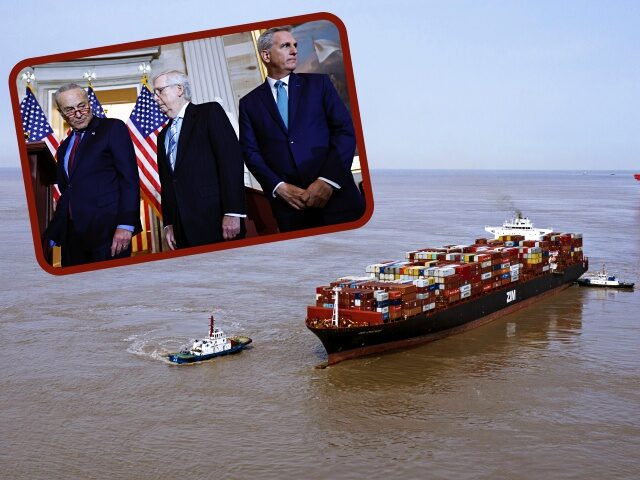Congress should suspend the United States’ decades-long, job-killing free trade status with China, Scott Paul with the Alliance for American Manufacturing told the House Select Committee on China this week.
In 2001, China entered the World Trade Organization (WTO) with the backing of former President George W. Bush’s administration and was subsequently awarded “permanent normal trade relations status” by the U.S. after congressional approval.
During the primetime hearing on Tuesday, Paul called on the Republican-controlled House and Democrat-controlled Senate to end U.S. normal trade relations with China.
“We should suspend or revoke normalized trade relations with China,” Paul said:
The CCP certainly doesn’t deserve the same trade status as our allies and reciprocal partners … our hubris and neglect aided Beijing’s ambitions, weakened our capabilities, and hollowed out our middle class. [Emphasis added]
Sens. Tom Cotton (R-AR), Ted Budd (R-NC), Rick Scott (R-FL), and J.D. Vance (R-OH) have filed legislation that would do just that. The China Trade Relations Act would end China’s normal trade relations status. Instead, presidential administrations would choose whether or not to authorize China’s free trade status with the U.S.
The legislation remains before the Senate Finance Committee, which Sen. Ron Wyden (D-OR) chairs and where Sen. Mike Crapo (R-ID) is the ranking member.
An identical version of Cotton’s legislation, though, has yet to be filed in the Republican-controlled House. The Republicans who sit on the House Select Committee on China include Reps. Mike Gallagher (R-WI), Robert Wittman (R-VA), Blaine Luetkemeyer (R-MO), Andy Barr (R-KY), Dan Newhouse (R-WA), John Moolenaar (R-MI), Darin LaHood (R-IL), Neal Dunn (R-FL), Jim Banks (R-IN), Dusty Johnson (R-SD), Michelle Steel (R-CA), Ashley Hinson (R-IA), and Carlos Gimenez (R-FL).
Paul also detailed how for decades American companies have made enormous investments in China with little to no pushback from Washington, DC, lawmakers and U.S. free trade with China, often subsidized by the federal government, has gutted the nation’s working and middle class communities.
“Bringing China into the world trading system in 2000 seemed like a slam dunk but instead became a spectacular failure of conventional wisdom and elite opinion,” Paul testified:
Governors sought Chinese firms for projects that cost American jobs: The San Francisco Bay Bridge, rail cars for Boston, Chicago, and other cities; even the Alexander Hamilton bridge in New York City, named for the father of American manufacturing policy. [Emphasis added]
Meanwhile, taxpayer-financed federal research was handed to China. One example: A breakthrough battery was invented at a U.S. national lab but made in China. American workers suffered. The trade deficit surged. 3.7 million jobs vanished. Wages plunged, communities were wrecked. The China import shock led to more deaths of despair and evidence of social unraveling.
[Emphasis added]
U.S. Trade Representative Katherine Tai has repeatedly sounded the alarm about the nation’s reliance on China for critical materials, products, and technology.
When executives have complained about U.S. tariffs on China, Tai has noted that the “fundamental problem” is not tariffs but rather that the U.S. is currently incapable of manufacturing basic necessities.
While skyrocketing U.S. trade deficits have translated to millions of American jobs being eliminated, tariffs would be a boon for reshoring jobs and boosting wages, studies show.
A recent study from economists at the Coalition for a Prosperous America, for instance, finds that tariffs on nearly all foreign imports would create about 10 million American jobs while boosting domestic output.
John Binder is a reporter for Breitbart News. Email him at jbinder@breitbart.com. Follow him on Twitter here.

COMMENTS
Please let us know if you're having issues with commenting.